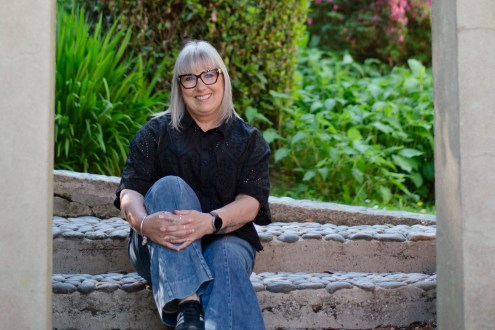How to stay grounded in times of change
Does the back-to-school feeling of September leave you restless and craving something new in your life? Kate Townshend shares how the shift in seasons arouses an edginess in her – itchy feet for lost dreams and new horizons. Find out if it's time to make a change this autumn...

September has always been an evocative month for me. The whisper of seasonal change in the air; the sense that the hedonism of the summer is coming to an end; the first autumn leaves dropping to the ground; a need to turn my mind to more serious things… I might not always purchase shiny new stationery any more, but the new-school-year excitement of a month of fresh beginnings persists.
Part of me is still eight years old in September, imagining my future as a novelist/human rights lawyer/prima ballerina extraordinaire, waiting for life to begin in earnest and viewing a vast vista of choice and possibility before me.
It can be exhilarating – but when you’re an adult with a long-term relationship, a mortgage and plenty of big decisions already made, it can also be unsteadying. I’ve learned to recognise that at the heart of this longing for adventure and change is an acute awareness that time is slipping through my fingers and must not be wasted. The feeling has become an old friend, but it’s still tough to figure out what to do with it sometimes – because, when I’m in the throes of restlessness, all sorts of everyday things can trigger a crisis. I’ll visit a new town and be gripped by the idea of other lives I might have lived, other versions of myself that might exist had I made a different decision somewhere along the line, Sliding Doors-style.
This often spirals into questioning all my choices in life thus far: Do I enjoy my job enough? Have I achieved enough? Do I love where I live enough? I become consumed by the urge to give up everything and move to France to eat pain au chocolat and write novels in a lavender-scented cottage – surely my true destiny! Even in the midst of this wondering, I can see that’s probably not a great idea, but how do I work out what I truly want in the moment?
What are you trying to tell me?
Psychotherapist Hilda Burke says it’s important to listen to our restlessness in case it is trying to make us aware of an issue in our lives: ‘When we feel restless, it can be because we don’t want to admit to ourselves that we’ve outgrown our job or that our relationship is no longer working. We shove the awareness of the issue that we’re having deep down into our subconscious and what surfaces may be restlessness – knowing that something just isn’t right.’
I know that in the past, an unsettled, yearning feeling was informing me something was wrong. In my 20s, I was trapped in an ‘accidental’ relationship with a housemate and in danger of becoming settled in a dull but reliable job. I had the things the world was telling me I should want, but I was lethargic and directionless – and the increasing intensity of the pricking, prodding feeling of wanting to do and be more was precisely what gave me the courage to change my life. I broke things off that October…
Uncloak the mystery
The change restlessness directs us towards doesn’t always have to be a practical one. It can be about giving ourselves permission to reconsider dreams we quashed as unrealistic. I wouldn’t be a writer without my restlessness pushing me to pursue a path I’d always been told was too challenging and outlandish to be a genuine goal.
Yet my September ennui and autumnal desire for adventure arrives even in years when I’m as happy as it’s possible to be with the big-picture parts of my life. I’ve literally cycled through them trying to understand: I love my husband deeply so that can’t be it. I cried with happiness when we bought our house, so that isn’t it. I’ve always wanted to do this job so how can that be it? Which leads to the question: when a major life overhaul is not required, what is actually going on?
Sometimes I write about my feelings to make sense of them, or talk to trusted friends. I make lists of possible plans or spend time mulling over the things in my life that are solidly gratifying versus the things that aren’t so satisfying.
The boring norm
Part of it, I’ve learned, is about a need to escape some of the less fun aspects of any life. I feel particularly restless when I’m overwhelmed and bogged down in the minutiae of my domestic routine – when running away from everything allows me the fantasy of shaking off my responsibilities and starting again. The siren song of new experiences frequently stands in opposition to the everyday slog of life. When I fantasise about that French cottage, the washing-up never comes into it.
But I’ve also learned that even when there’s a ‘grass is greener’ element to my imaginings, even when they are unrealistic, it doesn’t mean that the feeling doesn’t matter. I still need to listen. OK, I probably don’t need to move to a different country, but what I do need is to carve out space and time for myself.
Sometimes, a weekend adventure, a class to learn a new skill or booking a holiday to a new place is enough. There are, I’ve found, a thousand tiny ways to inject novelty into a life that has started to feel too narrow or mundane – to remind myself that life can still be full of intensity and adventure.
I’ve also found comfort and guidance in literature, reminding myself that this state has been shared by many before me. There’s something affirming about writers I admire grappling with it too.
‘I’m restless. Things are calling me away. My hair is being pulled by the stars again,’ wrote Anaïs Nin.
I need to feel alive
The trope of the wanderer, the traveller, runs throughout literature, along with an unwillingness to settle, both literally and metaphorically. I remember first reading Jack Kerouac’s On The Road, in which searching restlessness is given centre stage – with his protagonists using travel as a way of seeking the things they feel they lack. ‘Because in the end, you won’t remember the time you spent working in the oce or mowing your lawn. Climb that goddamn mountain,’ says Kerouac. I feel as if he’s talking to me, reminding me that it’s never too late to stretch myself or do something different.
Now that I’m older and theoretically wiser, I am keen to believe that restless yearning is a sign that I haven’t given up and am still keen to pursue fresh experiences, achievements and emotions. I still want to ‘live deep and suck out all the marrow of life’, as Henry David Thoreau wrote.
It’s unsurprising that when life feels samey, my spirit agitates for change. There’s relief in acknowledging and understanding this. Restlessness is complex and means different things in different contexts. Examining its motivations and catalysts ensures I don’t end up casting aside things of value in constant pursuit of the next horizon. I suspect I’d be on job 100 and relationship 50 had I not realised this.
As children, we’re taught that the best stories have an ending – a happily ever after at which stage we’re done with our adventure and should settle back to enjoy the life that we’ve created. In reality, this simply isn’t the case. In fact, the best way to be content, I’ve found, is to continue growing, learning and changing.
And, when change feels scary, maybe this September feeling is my nudge towards mixing things up – shaking the snow globe, in big or little ways.
And, if the feeling persists, it isn’t too late to retrain as a human rights lawyer-cum-ballerina.
What to do when you are restless
Therapist Hilda Burke tells us how to ease emotional fidgetiness
Meditate. Meditation is an effective way to sit with restlessness and bring peace of mind: ‘Mindfulness is an essential practice to still our minds and become comfortable with just being, rather than always doing (and striving),’ says Burke.
Grow your experiences. Look for simple ways to inject variety or adventure into your life. Visit somewhere new or explore an interest by taking a class or reading up on it.
Think it through and reassess. Use restlessness as a route to considering your wildest dreams for your life. Are they merely fantasies or is your restlessness asking you to take your dreams seriously and move towards them?
Count your blessings. Be cautious about letting restlessness mutate into dissatisfaction. Change the things that need changing, but don’t let restlessness stop you being grateful for the good things in your life.
Have a clear-out. A declutter of your home, or even a room, can ease your sense of domestic burden and being trapped in the everyday, adds Kate Townshend. ‘Removing items that don’t serve me any more brings a release from restlessness.’
Photograph: Getty Images
Words: Kate Townshend









